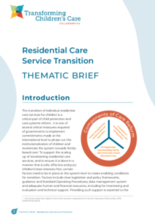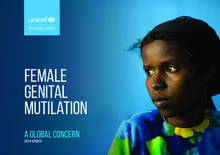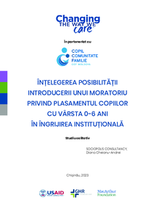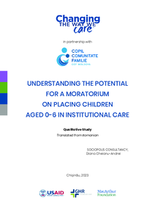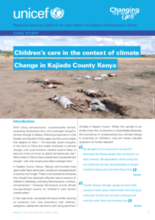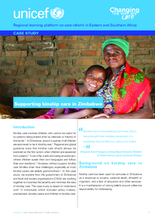Demographic Data
|
Sources: World Bank, UNICEF, UNDP HDR 2015, DHS 2014/2015 |
Displaying 231 - 240 of 14333
This brief contains high-level guidance and recommendations for policy and decision-makers and development partners to consider in designing frameworks to scale up, coordinate and support the transition of individual residential care services.
This report provides an updated data-driven assessment of female genital mutilation (FGM) around the world. It narrates through numbers the stories of millions of girls and women who have survived the practice and the millions more who remain at risk.
Programul Național pentru Protecția Copilului pe anii 202
This study analyzes statistical data on the institutionalization of children aged between 0-6 years; examines current practices of prevention, identification, assistance, referral, and placement in institutions and family based alternative care; evaluates the knowledge and attitudes of professionals and decision makers and outlines recommendations for the development and introduction of a moratorium on placing children aged between 0-6 years in residential care.
In this case study the authors look at the impact of climate change-related events on various aspects of children’s care by drawing on evidence from nine interviews with children, caregivers, residential care home staff and government officials in Kajiado County, Kenya.
In this case study, the authors explore how the government of Zimbabwe and local civil society organisations (CSOs) are working together to maximise the benefits and minimise the risks of kinship care. The case study is based on interviews with 12 individuals which included policy makers, practitioners, kinship carers and children in kinship care.
A Palestinian boy has been talking about living on his own in Gaza after his mother had to leave with his injured sister. UNICEF says there are thousands of unaccompanied children in Gaza after five months of Israel’s war.
This 2023 update report is published during the Commonwealth Year of Youth and for the 50th anniversary of the Commonwealth Youth Programme and will support policy-makers, governments and the public to reflect on progress made over more than a decade and to develop new strategies for strengthening the enabling environment for youth empowerment.
This study reports results concerning close embodied practices, involving touch, in early childhood care settings in Sweden during the COVID-19 pandemic.
Around the world, millions of children are growing up in orphanages, or children's homes as they are called in many places. But research has shown that the vast majority of them, actually have families.

